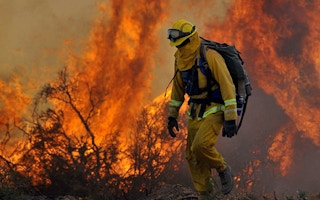The tragic events in Yarnell, Arizona, where 19 firefighters died battling a forest fire, brought to the forefront the dangers of forest fires.
The changes in climate that have been observed during the past decades together with socio-economic factors involving land clearance and agriculture has had a serious effect on both the frequency and scale of forest fires.
In many fire-prone regions a lack of rainfall has brought on periods of drought that steadily desiccate all plant-life, leaving it very flammable. Heatwaves where the temperature is considerably above normal for many consecutive days have been more frequent, facilitating the spreading of fires. Irregular patterns of weather have emerged throughout the year, creating conditions where extended dry periods lead to greater chances of fire.
Although these changes have been felt in many countries, according to climate change projections they will not be spread uniformly around the world. For example, it is predicted that northern Europe will be greatly affected, and the problem of forest fires may become considerably more frequent and severe than countries are used to. In southern Europe where fires are already a problem the situation will only get worse.
Fire statistics indicate that yearly burned areas increased in most countries during the past decade with larger and larger fires being recorded. This happens in spite of increasing scientific and technical solutions used to detect and suppress fires.
Another growing problem comes where wild land and urban areas meet – this where fuel, fire, people and houses come together. In order to protect human life, valuable buildings, the forest and the environment, the general rule is to suppress all fires whenever possible. This effort requires the existence of dedicated agencies with trained personnel and equipment to face not only the expected, but also extreme situations. These organisations exist mainly in those countries used to facing fires (such as the “hotshot crews” in the US), but other countries are ill-equipped or trained to deal with this problem, even though it is likely to be one they will face in the near future.
Climate change is affecting patterns of vegetation, and this needs to be taken into account by land management that introduces less flammable species.
Urban planners should avoid allowing building in high-risk areas, or where it can cause problems for fire suppression. Regulations on the use of nonflammable materials and good building standards should be enforced. In some countries, many of these measures are already in place – it is those that still have to catch up that will have most problems.
Forest fires have caused considerable death and destruction in the past, such as in Greece in 2007 which killed 84, or the Black Saturday fires northeast of Melbourne, Australia, which killed 179 in a single day in 2009.
In spite of their experience, training, equipment and established fire safety rules, firefighters as well as civilians can be surprised by rapid changes in the movement of flames and do not have time to escape. Fire can be unpredictable, and even small fires can kill. In my experience, most accidents with many fatalities involve some form of fire eruption – usually associated with fires moving up slopes or through canyons – that is the cause of a sudden, rapid progression of flames.
In general, fire protection systems cope quite well with small to medium fires, but in extreme situations fires are very difficult to control and it is these that have become more frequent. For the future, we need fuel management programmes with well-planned interventions in strategic areas, alongside a knowledgeable population that respects the environment, and especially minimises fires caused by humans in high-risk areas. We must ensure our preparations for the future outpace the flames themselves.
This post originally appeared here. Domingos Xavier Viegas is a professor at the University of Coimbra in Portugal.

















